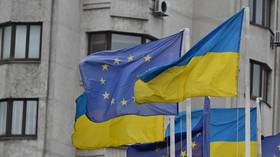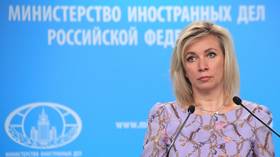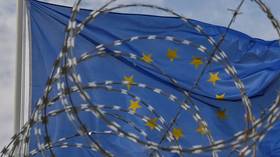Kremlin reacts to Ukraine’s EU-candidate status

It’s the business of Brussels to decide on whom to grant EU-candidate status, but it should be done in a way that wouldn’t create more problems for Russia, the Kremlin press-secretary Dmitry Peskov said on Friday.
When asked to comment on the European Council’s decision to grant Ukraine and Moldova the status of EU candidates, Peskov pointed out that “those are, of course, internal European affairs.”
However, he added that “it’s very important for us that those processes won’t create more problems for us and for our relations with those countries.”
“There’s enough of those problems already,” the spokesman acknowledged, referring to Russia’s ongoing military operation in Ukraine and the course on severing ties with Moscow taken by Moldova since Maia Sandu became president last year.
Giving EU-candidate status to former Soviet Republics also shouldn’t lead to further deterioration of ties between Moscow and Brussels, Peskov continued.He regretted that Moldova “for some reason associates its candidate status with taking an increasingly anti-Russian stance.”
“They think that the more anti-Russian they became they more the Europeans will like them. We really don’t want that to be happening.”
Peskov also stressed that securing candidate status was no guarantee of becoming an actual member of the EU.
He recalled how back in the Soviet times he’d worked as a diplomat at the embassy in Turkey and the country “was ready to give up a lot in order to become an organic part of Europe.”
“Well, we see that Turkey hasn’t yet gone anywhere further than this candidate status, but at the same time became a sovereign, independent country,” the spokesman argued.
Russia's foreign ministry spokeswoman Maria Zakharova had some harsher words to say about EU’s decision to make Ukraine and Moldova candidates to join the bloc.
Zakharova claimed Brussels was continuing its strategy of “active geopolitical development” of the former Soviet space in order to “contain" Russia.
“All means are being used,” she added, “from financial and economic leverage to military support.”
Earlier this month, Russian President Vladimir Putin said that Russia has “no objections” to Ukraine taking the path of joining the EU as, unlike NATO, it wasn’t a military bloc.
However, he pointed out that the country would require a lot of financial aid to meet the standards set by Brussels and warned about the risk of Ukraine morphing into “a sort of semi-colony” from becoming a member of the bloc.














